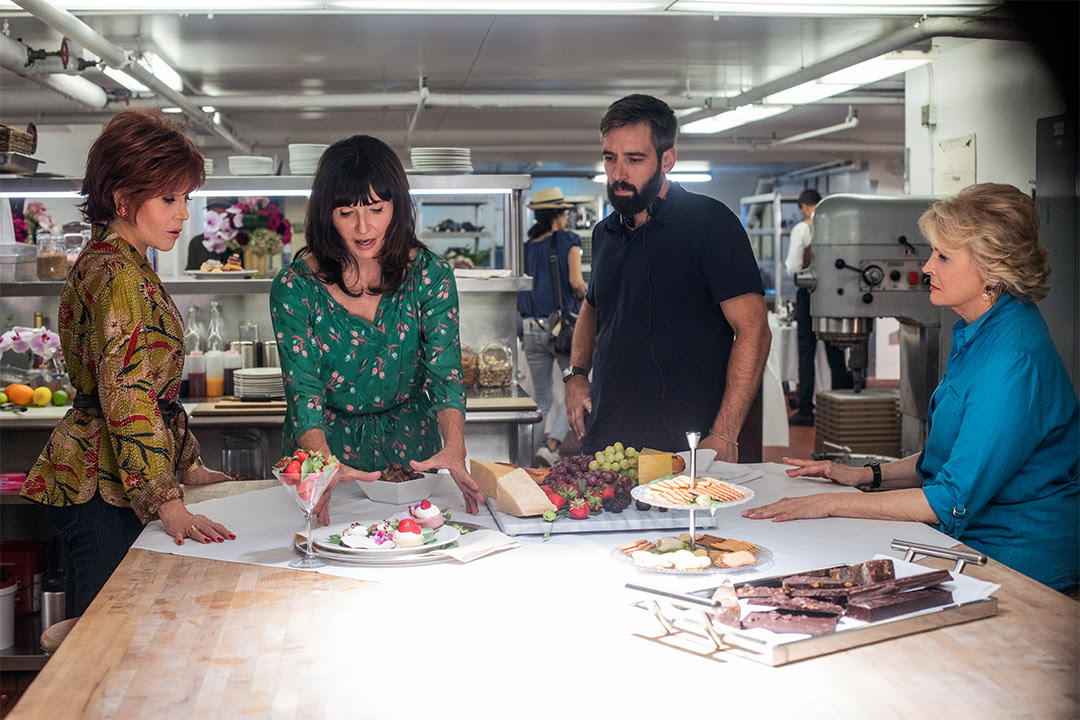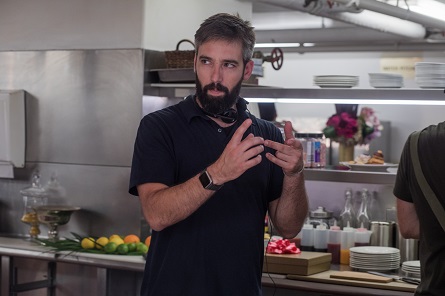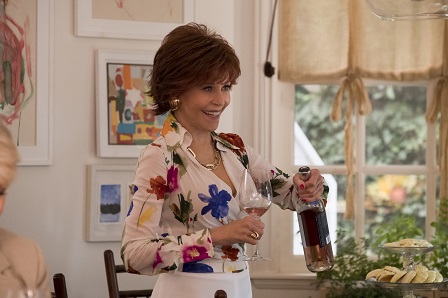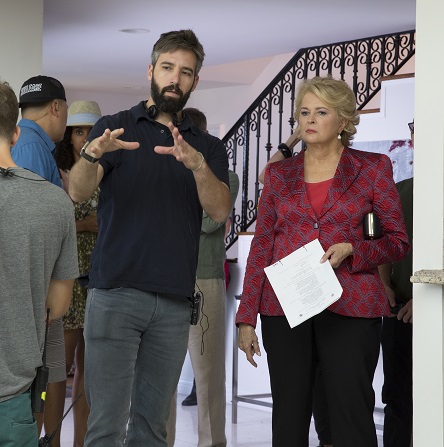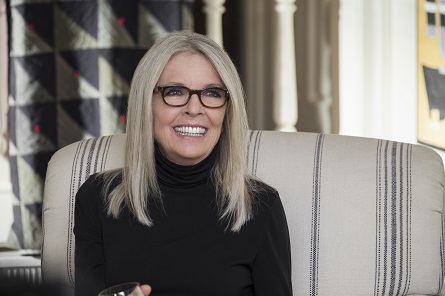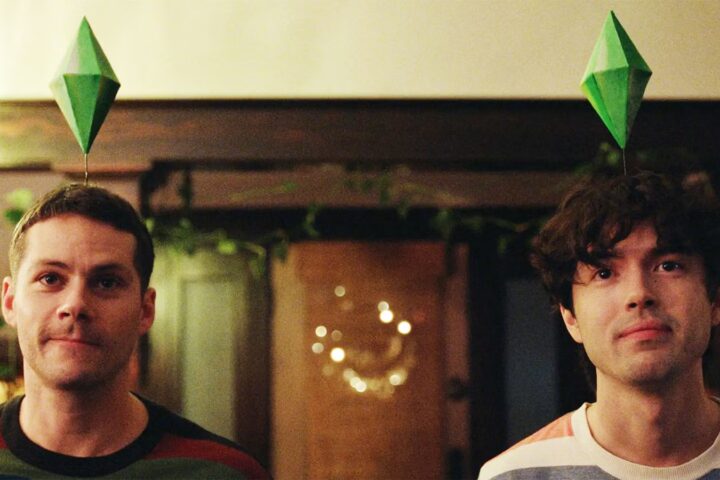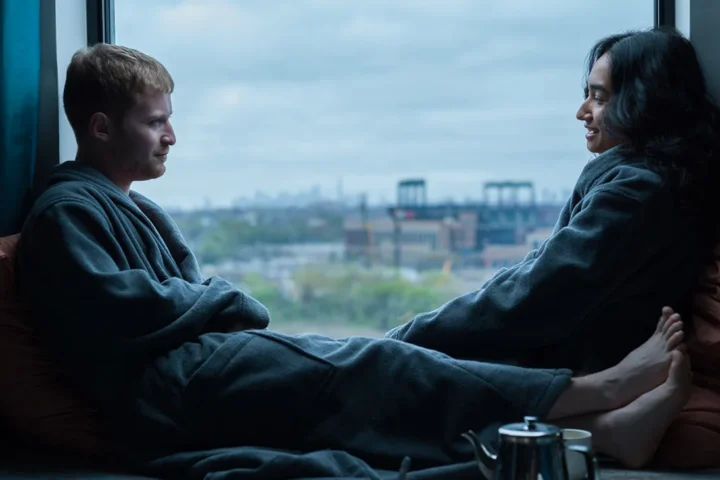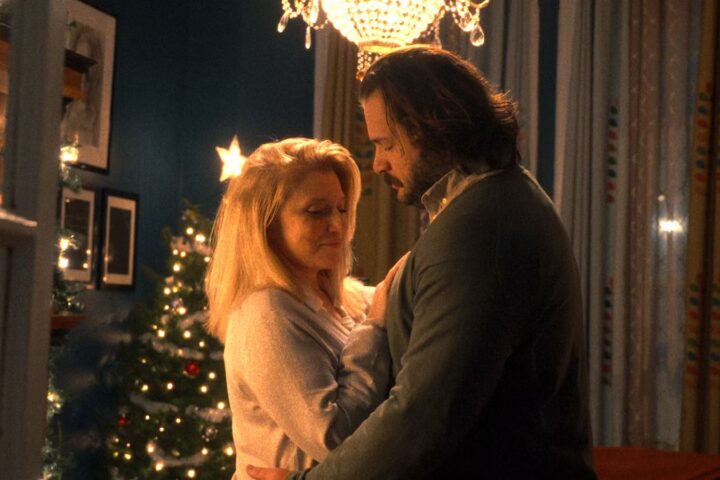Book Club, director Bill Holderman’s sweet, funny new comedy about four lifelong friends unexpectedly liberated by Fifty Shades of Grey, says it’s never too late to rediscover yourself—and love. But the real story in this glossy, zippy movie starring Jane Fonda, Diane Keaton, Candice Bergen and Mary Steenburgen, is one of the power of movie stars, which it has in spades.
Long-time producer turned first-time director Holderman, a key creative driver at Robert Redford’s Wildwood Enterprises, co-wrote the film with partner Erin Simms, and in mounting a tart comedy of adult women with believable identities, neuroses and needs, the duo has subverted Hollywood’s current crop of infantilizing products to deliver a solidly appealing commercial movie for grown-ups. And that’s something, actually.
I caught up with Bill Holderman recently to discuss his hardworking comediennes, ageism in Hollywood and his first time behind the camera, calling the shots with Hollywood legends.
This is a big moment for you.
It’s all starting to register! I am feeling the significance of it. It is all completely surreal. Anytime I even see the poster I am pinching myself.
Like a dream come true?
It is! You start with that blinking cursor and an idea of, “Oh, I want to write something for Diane Keaton.” Honestly, she’s on the poster so I know she is in the movie, but it is still like, “Wow.” You don’t think it’s going to happen and when it does it is hard to process.
The film contains a pointed discourse on ageism courtesy of the younger characters, who have a predetermined idea what is possible or acceptable from parents.
Right. Part of this is the ageism of society but at a certain point we set people out to pasture and believe them to be irrelevant, and when we think about our parents, we have such a fear-based parenting model here- I think we infantilize them and think that there is no way they are going to have emotions and feelings and relationships.
Yes, it’s like a taboo for us to even think about. People are having second and third lives now, much later.
It is! It’s a completely taboo thing, not unlike what these books sort of stimulated in people. It’s like a double taboo. But I think it’s a real thing. That generation still has every desire to meet and connect and do everything that those in their twenties, thirties, forties and fifties do. But I think there is a lot of societal pressure to ignore it.
Were you aware during production that in addition to making a narrative piece of entertainment, you also, by virtue of giving four great actresses plumb roles that they typically would not be offered, had constructed an industry narrative as well?
Yeah. We did not set out to write this because there was an underserved audience and because these incredible actresses that we love were not getting these types of roles. We really had an idea of female friendship at a certain age and the desire to continue to live a full life and pursue happiness and all of those things, but having made the movie and heard from each of them how nice it was that they all had full backstories and arcs and led their own narratives, I realized, “Wow, I am shocked that this doesn’t exist anymore.” It wasn’t premeditated, but I was so happy to have the opportunity because they are incredible actresses.
The interesting thing in Hollywood is that it isn’t only women that are sixty-five or seventy, it’s those that are over forty. So if you are smart, you form your own production company and start looking for projects everywhere to cultivate, like perhaps every book on The New York Times bestseller list, or wherever. You truly need to forge your way. Also, while it’s clear that industry has really cracked the code of youth, or at least adolescent, culture with the proliferation of the Marvel movies, they seem very uninterested in anything adult-oriented and even less so in films led by women. I recently read that Annette Bening is going to join the Marvel universe, and to me that is just through the looking glass.
Yes, I saw that. The metrics do not always align. With the younger audience you can sort of- if you put enough action, they are going to go. I don’t think that is necessarily true for this demographic. I think they are more discerning and I think that is very hard for Hollywood. And Hollywood is very reflective of society, and I think there is a tremendous amount of ageism in America.
You called yourself a ‘default’ director with this movie.
I did? Oh, geeze… Part of it was that it was not my intention from the get-go to direct. But through the process of producing, and then writing and producing, it became a very logical next step. But I know there are directors who were born with this idea that it is all they wanted to do, but it was an evolution for me. The more I wrote and produced and was deeply involved and hands on, it felt like, “Man, I just have to do that too.” Because you have a strong vision for something and a desire to manage the story beyond what you are allowed to do as a writer and producer. And so it became, “I’m not letting anyone else do it.”
Tell me a bit about working with Mary Steenburgen. There is something very sweet about her and I thought the dance sequence—to Meat Loaf, no less—was really endearing. She really put herself out there.
Yes. She is one of the most effervescent people you will ever meet and an incredibly soulful person. She is a delight and has such a big heart. She is from Arkansas and is one of those people who is so kind and so nice and so giving and so genuine. It is such a rare grouping of qualities for someone in Hollywood who has been a movie star for as long as she has been. She is also one of the hardest working actors in the business.
As far as the dance, she had done a tap dance back in the early 80s in Melvin and Howard, so when the idea came up she was the one who pitched the tap dance, and we were like, “That’s amazing. It is going to be really fun.” She worked very hard with the choreographer, and she and Craig did together as well. This is a movie without many big set-pieces and this is one of those anchor moments. It is sort of the penultimate moment for her character and marriage, and there was a lot of pressure on that scene to work. If it had not then the movie’s third act would have been jeopardy. Luckily Mary is who she is, and she brought it. I am sure her feet were bleeding by the end of the day, but she brought it all day long. And she and Craig have a tremendous amount of chemistry having worked together before, and you see it. You see the light in her whole being in that scene. It was very nice to watch.
It’s the sweetest moment and nice marriage of music and story.
Yes! Who doesn’t love Meat Loaf?
How does one give direction to Jane Fonda?
Jane Fonda wants direction. She really does. It is so weird because she is Jane Fonda, but she wanted to make me happy. It was amazing.
Was there a moment when you just stopped looking at her as Jane Fonda?
You have to. On set you have have to fulfill the role because you have a hundred people there and these incredible actors, and the last thing you want to do as a first-timer is disappoint anybody by not stepping up to the challenge.
But I will tell you think about Jane Fonda. On more than once occasion I would go over after a take and she always very sweetly said, “Any notes?” And I would usually say, “You know what? We are going to do it again. And I have nothing because that was perfect.” And that is what you get with Jane Fonda. She is so good and so on it and respectful of the script, and aware of her own character and where she is coming from and where she is going.
I understand she did significant due diligence on the character before even arriving on set, correct?
Yes. She really digs in the way you want an actor to. They all did. But with Jane, particularly, it’s her process- she shares her process. And it was pretty cool to see, and you can see why she has been as great as she has been for so long.
The other thing that is amazing is that Jane is now 80. She is one of the sharpest minds I have ever met in my life, hands down. She is so smart. So smart. And I think that even though she is who she is, I think she is underestimated. It is amazing.
She has a scene late in the film where Don Johnson is sitting on the rooftop with her. There is a close-up that is what you might call a textbook movie star moment.
Yeah. You can’t direct that. You just hope and pray that you have actors who can bring that. Not all can, but she certainly can, and it was a blessing. I remember one particular day we were going to start shooting and she was wearing heels and she tripped and fell directly into a rose bush—fell to the ground—and cut herself and even ripped her dress. And of course, I was panicked and ran over and asked her, ‘Are you okay?’ She stood up, said she was perfectly fine and ready to shoot. That’s how she is.
Tell about the look of the film, which is so important for a romantic comedy. The palette here by your DP, Andrew Dunn, is primaries and pastels and it looks great from Santa Monica to Sedona.
I was so lucky to shoot in L.A. because Los Angeles is green all year around and so full of life, and one of the things that I really wanted to fill the frames with was that life. I wanted it lush and green. These women are not at the end of their lives. And I did not want anything to indicate that. I wanted it to all be full of life and in full bloom. And so with our cinematographer Andrew Dunn—an absolute genius—he and I talked a lot about making sure it was full of life and energy that we were feeling from our cast. So we really did try to sort of fill it with that. There are many bright flowers and colors and that was by design.
How did Andy Garcia come to the film? He’s very gentle here.
Oh, yes! One of the things we decided in the casting process was knowing that all the women know so many people in Hollywood and have history and sometimes that is positive and sometimes it is negative. You don’t want to guess which one and end up with a bad situation, so I brought the women into the casting process. That was the other amazing thing. To see the reaction in Hollywood and amongst the actors we ended up getting—once the knew these were the actresses in the movie, they wanted to be in this movie and support these women in such a real way. I give them incredible credit because that is not always the case in Hollywood.
Diane Keaton’s first choice was 100% Andy Garcia, who ended up getting his hands on the script and calling us. Diane and Andy had known each other since The Godfather III. They are close and have a great dynamic, and so when his name came up—and he was not necessarily who we envisioned while writing it—but as soon as that idea came up and I met him, I was blown away. As an actor, I have never seen anything like his chops. What he does is listen, and he is so in those scenes and in those moments. You can feel it.
Did you see him in When a Man Loves a Woman? He was just great.
Yes! But he does not get to play romantic leads very often. And I think from the reaction that I am hearing, everybody is falling in love with him and they should because he is so charming and effortless.
And perfectly paired with Keaton. You can tell they are having fun from their first scene on the plane.
Yes. And they have such a comfort there that they are able to play off each other.
Diane Keaton is a joy all the way in this movie. I love her funky, individual style. She is, in some ways, the heart of this movie. How about her sense of comedy? I have always admired how she plays every moment, and how every reaction and has this dithering, lovable thing that is her trademark. Does she just make that comedy out of thin air? Is it that effortless because it’s just her?
It feels effortless when you see it, but she is a really calculated, smart actor. She is playing a version of herself for sure, but she is a really, genuinely great actress. The scenes have to make sense and the dynamics have to be real. And then when she is in the mode it is so natural. And that was the value of having her and Andy. They are both such great listeners and so in the moment and real that whatever happens organically in the scene gets played with complete, grounded believability. And that is part of her charm. She is also hysterical because she is who she is. She is that full package of all of the neuroses and everything else that we love about her. But yes, there is no other Diane Keaton.
And of course, her many great dramatic performances like Shoot the Moon with Albert Finney, Reds, The Good Mother and so many more.
Yes. She is genuinely brilliant. And she loves comedy and is great at it. She is also one of those people is fascinating in the real world as well. Her design sense and eye for it…
I’ve heard her house is fantastic.
Oh, it’s incredible. She wrote a book called The House that Pinterest Built that walks you through the entire process. Get it.
What’s the best part about your job?
Working with them. It was so much better than I ever imagined to be working with them and able to collaborate. There is no greater gift than to have people who care about the characters, the themes, the movie and also come from a place of so much knowledge and be able to bring all of that and have those collaborate conversations was so inspiring.
Book Club started as a blinking cursor, then it was a draft and then a final, and then the stars got onboard, and then you shot and were seeing those words lifted off your page. What was that moment like for you?
Because of the pressures of production, you’re in a state of shocked numbness so you don’t have time to fully process it. It is not until you get it really at this stage or even in the editing room where you start to process it and are like, “Wow, that was something special, just to have witnessed that experience and those words coming to life.” You disconnect form your body and hover above. It’s completely surreal.
